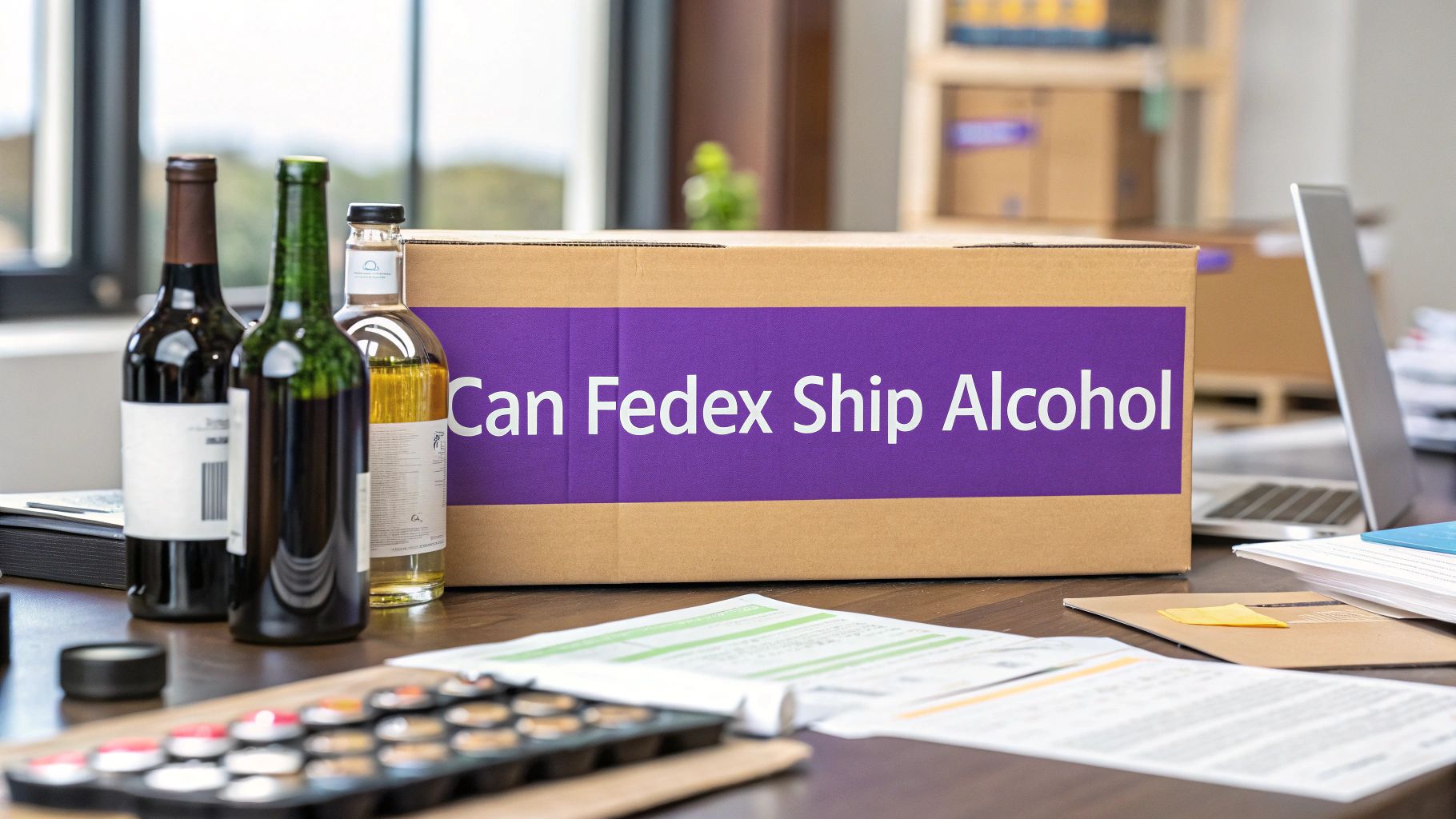
Can FedEx Ship Alcohol? A Guide for Businesses
Can FedEx ship alcohol for your business? This guide covers the strict rules, licensing, packaging, and state laws you need to know for compliant shipping.
Cody Y.
Updated on Aug 19, 2025
Yes, you can ship alcohol with FedEx, but there’s a major catch: you have to be a licensed business holding a special agreement. FedEx strictly prohibits individuals from shipping any kind of alcoholic beverage—whether it's wine, beer, or spirits—through its network.
Understanding FedEx Alcohol Shipping Rules
So, when someone asks, "Can FedEx ship alcohol?" the answer is a qualified "yes." While you can't send a bottle of wine to a friend for their birthday, licensed businesses have a clear, though heavily regulated, path forward. Think of it as a members-only club with strict entry requirements. To get in, your business must be legally authorized to sell and distribute alcohol.
This isn't as simple as just dropping off a package at the local FedEx Office. Before you can ship a single bottle, you must sign a formal FedEx Alcohol Shipping Agreement. This contract is the foundation of your relationship with the carrier, clearly outlining your responsibilities and confirming you'll comply with every applicable law. It’s FedEx's way of ensuring that every case of beer or pallet of spirits is handled legally and safely from start to finish.
Once you're approved, navigating the process puts the responsibility for compliance squarely on your shoulders. You are responsible for knowing and following the rules for every single shipment.
This includes:
- Licensing: Holding all the right federal, state, and local licenses to both sell and ship alcohol.
- Destination Laws: Verifying that the specific state, county, and even city you're shipping to legally allows alcohol deliveries to consumers or other businesses.
- Packaging: Using only FedEx-approved packaging that’s specifically designed to protect fragile glass bottles and prevent any leaks.
- Labeling: Attaching special labels to every box, including one that requires an adult signature upon delivery. No exceptions.
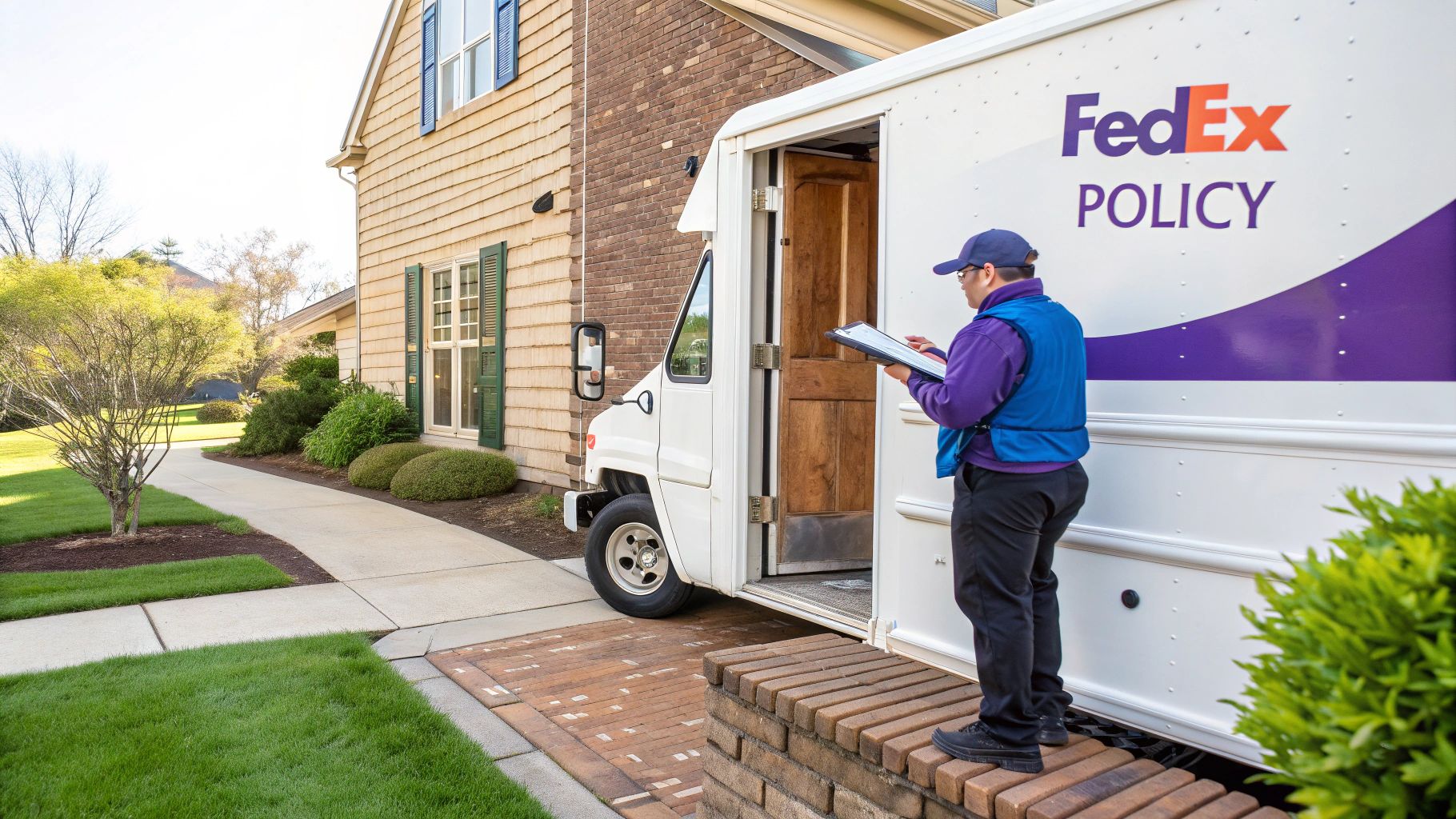
Failing to meet these requirements can get you into serious trouble, leading to refused shipments, packages returned at your own expense, or even losing your shipping privileges entirely. FedEx provides the transportation, but you have to guarantee the entire journey is legally sound. The rules are this strict because the penalties for non-compliance—for both you and the carrier—are severe. This entire framework is designed to prevent illegal distribution and, most importantly, sales to minors.
To make it easier to see the big picture, here’s a quick breakdown of FedEx’s core requirements.
FedEx Alcohol Shipping At a Glance
This table summarizes the most critical rules for any business looking to ship alcohol with FedEx. Think of it as your quick-reference guide.
| Requirement Category | Who Can Ship | Who Can Receive | Agreement Needed | Special Handling |
|---|---|---|---|---|
| FedEx Rules | Only licensed alcohol producers, distributors, or retailers with a signed FedEx agreement. | Consumers of legal drinking age or other licensed entities, depending on state law. | Yes, a formal FedEx Alcohol Shipping Agreement must be in place before any shipments. | All shipments require an Adult Signature Required label and FedEx-approved packaging. |
Ultimately, this structure ensures that everyone in the chain of custody is accountable, from the moment the package leaves your warehouse to the moment it’s signed for at the destination.
Who Can Actually Ship Alcohol with FedEx?
<iframe width="100%" style="aspect-ratio: 16 / 9;" src="https://www.youtube.com/embed/V-IThgDqMIs" frameborder="0" allow="autoplay; encrypted-media" allowfullscreen></iframe>Let's clear up a common misunderstanding right away: you can't just walk into a FedEx store and ship a bottle of wine to a friend. FedEx reserves alcohol shipping exclusively for a select group of approved, licensed businesses. So, if you're an individual looking to send a celebratory bottle as a gift, you're unfortunately out of luck using your personal account.
The biggest hurdle here is licensing. Before you can even think about shipping, your business must hold all the required federal, state, and local licenses that legally permit the sale and distribution of alcoholic beverages. This isn't just a suggestion—it's the absolute foundation of the entire process and is completely non-negotiable.
The Role of the FedEx Alcohol Shipping Agreement
On top of having the right licenses, every potential shipper has to sign a formal contract called the FedEx Alcohol Shipping Agreement. Think of this agreement as your official "license to ship" within the FedEx network. It's a legally binding document where you promise to follow every single rule, regulation, and packaging standard to the letter.
By signing it, you’re taking on full responsibility for compliance. That means making sure every single package is sent from a licensed business to a legal destination, is packed securely, and is labeled correctly. This is FedEx’s way of ensuring that both they—and you—are shielded from the hefty legal and financial penalties that come with shipping alcohol incorrectly.
Who Qualifies as an Approved Shipper?
So, who are these approved businesses? FedEx's policy is built for legitimate, commercial operations in the alcohol industry. The list of who can get approved is pretty specific:
- Producers: Wineries, breweries, and distilleries that actually make the alcoholic beverages.
- Wholesalers and Distributors: These are the intermediaries that move alcohol from the producers to retailers.
- Retailers: Licensed brick-and-mortar or online stores that sell directly to consumers, but only where the law allows.
- Importers: Companies that are licensed to bring alcoholic beverages into the country for distribution.
Key Takeaway: FedEx has a strict no-consumer policy for shipping alcohol. The service is only for licensed businesses like wholesalers, distributors, importers, and certain retailers who have signed the FedEx Alcohol Shipping Agreement. This system ensures everyone follows the law and handles these sensitive shipments properly.
This strict framework means that if you run a small online wine shop or a craft brewery, there’s a path forward. It all starts with getting your licenses in order and then formally applying for and signing the shipping agreement.
For anyone trying to navigate the headaches of setting up alcohol shipping rules for an eCommerce store, automated tools are a lifesaver. This kind of system ensures every order you process follows the complex web of regulations governing the industry. You can learn more about tackling these challenges by exploring solutions for alcohol shipping compliance.
Navigating the Maze of State and Local Laws
Getting that FedEx Alcohol Shipping Agreement is a huge first step, but it's really just the beginning. Think of the agreement as your passport—it gets you into the airport, but you still need a separate visa for every single state, county, and city you want to ship to. This is where the real work begins, because the laws are a complex and often confusing patchwork.
FedEx makes one thing crystal clear: the shipper is 100% responsible for legal compliance. They handle the logistics, but you’re expected to be the legal expert for every package you send. That means knowing the specific rules for your own location and the final destination.
Wet, Damp, and Dry Territories Explained
The United States doesn't have one simple, unified law for shipping alcohol. Instead, the country is a mosaic of "wet," "damp," and "dry" territories.
- Wet Territories: These are areas that generally permit the sale and shipment of alcohol, though you'll still find specific rules. Most major metro and suburban areas fall into this category.
- Dry Territories: These counties or towns completely outlaw the sale of alcohol. Shipping alcohol to a customer in a dry county is illegal, no matter what the broader state law says.
- Damp Territories: This is where things get really tricky. A "damp" area might allow beer and wine sales but ban spirits, or maybe it only allows sales at state-run stores.
These distinctions create invisible borders that can stop a shipment cold. A customer might live in a state that broadly allows direct-to-consumer (DTC) shipping, but if their specific ZIP code is in a dry county, that delivery is illegal.
A classic mistake is assuming state-level approval is all you need. Texas, for example, generally allows wine shipments, but over 50 of its 254 counties are completely dry. An order to one of these locations would violate local law, even if it looks perfectly fine on the surface.
Different Rules for Different Drinks
The complexity only deepens when you look at the type of alcohol you’re shipping. The laws for wine are often worlds apart from the laws for spirits or beer. Many states that have opened their doors to DTC wine shipping over the last decade still heavily restrict—or outright ban—spirits shipments to consumers.
For instance, a licensed winery in California might be able to ship directly to a customer in another state, but a distillery in the very same city could be prohibited from sending a bottle of gin to that exact same address. You absolutely have to understand these nuanced, product-specific restrictions. For a deeper look at how these rules apply across different products, our guide on common shipping restrictions is a great place to start.
This breakdown shows the absolute must-haves for packaging every single alcohol shipment you send.
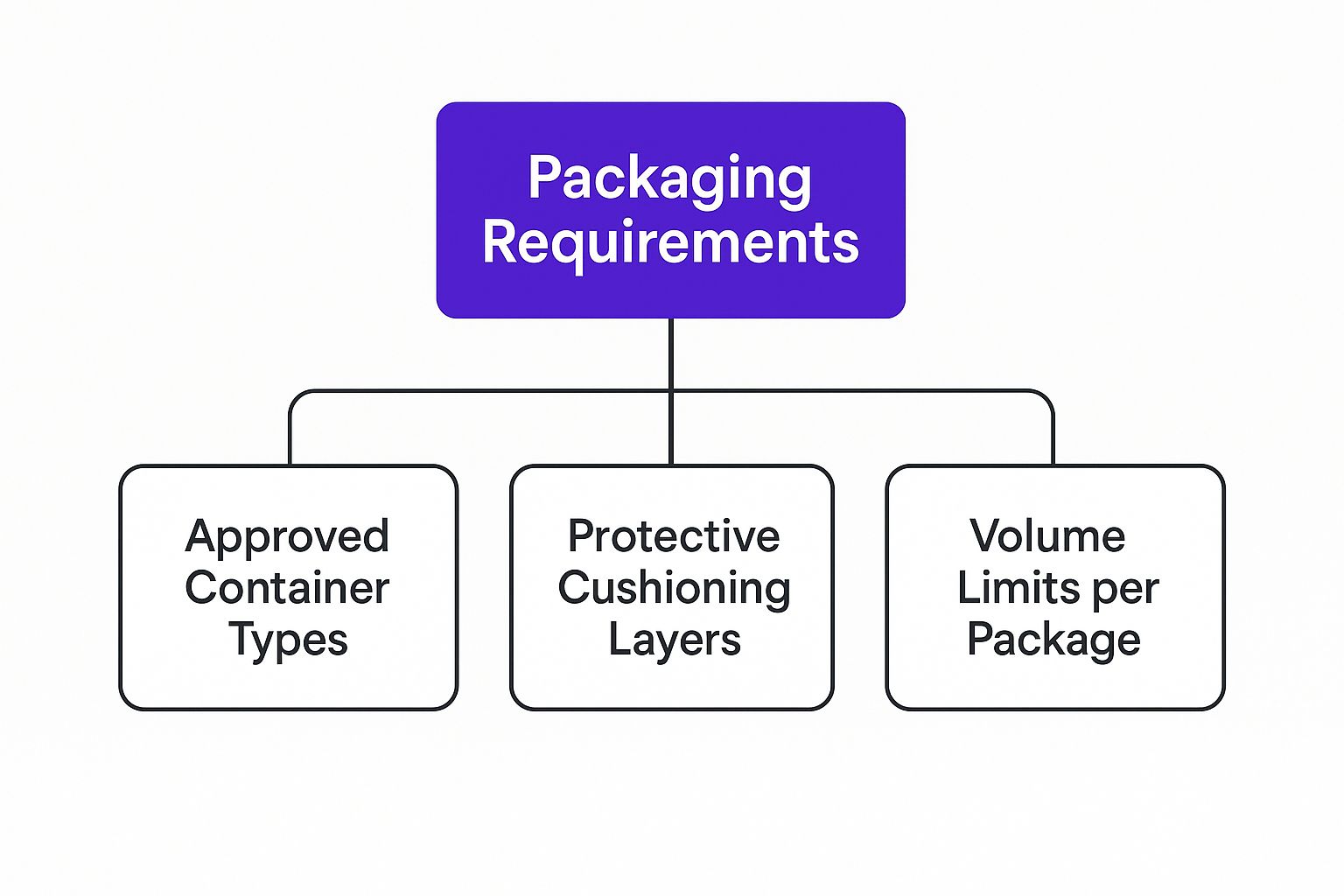
It’s a good reminder that compliance isn’t just about the law—it's also about the physical prep work, from choosing the right container to using the proper cushioning, to make sure every package arrives safely and securely.
Mastering FedEx Packaging and Labeling Rules
When you're shipping alcohol with FedEx, the box and its labels are just as critical as your licenses. Think of it as the final checkpoint before your bottles enter the FedEx system. Getting this part wrong is a fast track to refused shipments, expensive returns, and even damaged products. Precision is everything.
This isn't about just grabbing any sturdy box off the shelf. FedEx has specific, pre-approved packaging designed to handle the bumps and drops of transit while keeping fragile glass bottles locked in place. The entire goal is to achieve zero movement inside the box—that’s your best defense against breaks and leaks.
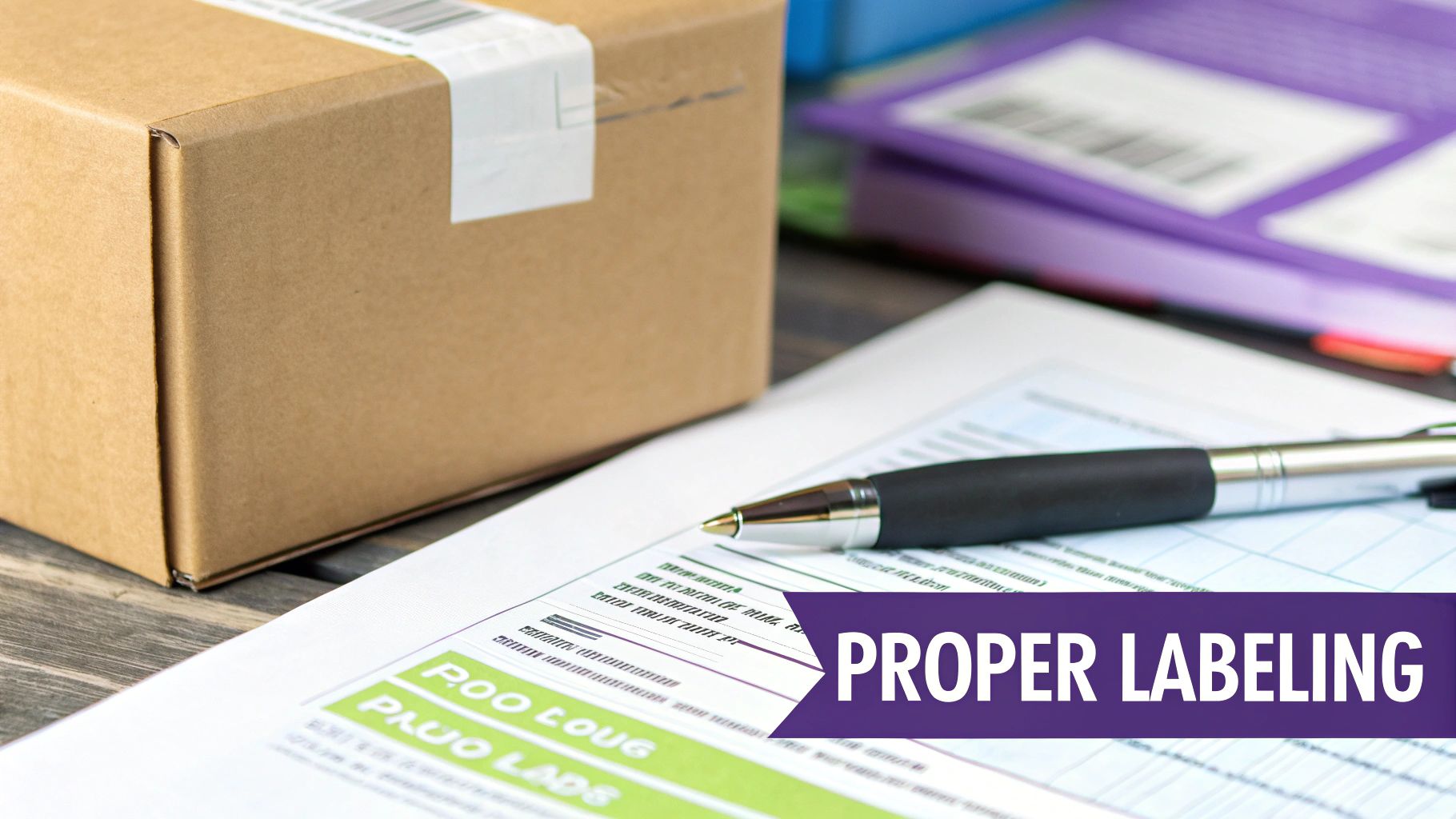
The Anatomy of a Compliant Package
To build a package that FedEx will accept, you need to use materials engineered specifically for shipping alcohol. Forget about bubble wrap and packing peanuts; they simply won't cut it. FedEx requires a complete system where every component works together to protect what's inside.
Here are the essential pieces you'll need:
- A High-Quality Corrugated Cardboard Box: Your outer shell needs to be new and strong. Reusing old boxes is a classic mistake that can seriously compromise the box's structural integrity.
- Molded Polystyrene (EPS Foam) Inserts: These are the gold standard. EPS foam shippers are molded to fit bottles perfectly, absorbing shocks and stopping any and all movement.
- Pulp Dividers or Die-Cut Corrugated Inserts: As an alternative to foam, these inserts create individual cells for each bottle so they never touch. This prevents the glass-on-glass contact that causes cracks and breaks.
This combination effectively creates a protective cocoon around each bottle, making the whole package tough enough to withstand drops, vibrations, and the weight of other boxes stacked on top of it.
Applying the Correct Labels
Once your box is sealed up tight, you have to apply the mandatory labels. These aren't just for show—they give critical handling instructions to every single FedEx employee who touches your shipment. A missing or incorrect label is one of the quickest ways to get a shipment kicked back to you.
FedEx is crystal clear about its rules. The company allows beer, wine, and spirits shipments, but only when each package is prepared correctly. This means using FedEx-authorized materials and applying the right labels, like the FedEx Alcohol Shipping Labels (SEL 169 for domestic and SEL 170 for international). You can get a full rundown of these requirements to better understand FedEx shipping rates and rules for alcohol.
Two labels are absolutely non-negotiable:
- The FedEx Alcohol Shipping Label: This special label clearly marks the contents as alcohol. It's a fundamental part of your agreement with FedEx and tells their team the package is part of the approved alcohol shipping program.
- The Adult Signature Required Sticker: This is arguably the most important sticker on the entire box. It’s a legal mandate that requires the FedEx driver to get a signature from someone 21 or older with a valid, government-issued ID. A package with this sticker can never be left on a doorstep.
Crucial Tip: Always place these labels prominently on the top or side of the box. Make sure they aren't covered by other shipping labels or tape. Clear visibility is absolutely essential for compliance and a smooth delivery.
To help you keep track of all the moving parts, we’ve put together a simple checklist. Run through this before you seal every box to make sure you haven’t missed a step.
FedEx Alcohol Packaging & Labeling Checklist
| Checklist Item | Requirement Details | Status (Checkbox) |
|---|---|---|
| Use a New, Sturdy Box | Outer box must be new, corrugated cardboard. No reused boxes. | ☐ |
| Select Approved Inserts | Use either molded EPS foam inserts, pulp dividers, or die-cut corrugated inserts. | ☐ |
| Ensure No Internal Movement | Bottles must be held snugly. Shake the sealed box to confirm zero movement. | ☐ |
| Seal the Box Securely | Use high-quality packing tape on all seams to prevent accidental opening. | ☐ |
| Apply FedEx Alcohol Label | Attach the correct FedEx Alcohol Shipping Label (e.g., SEL 169 for domestic). | ☐ |
| Apply Adult Signature Label | The "Adult Signature Required" sticker must be clearly visible. | ☐ |
| Position Labels Correctly | Place all required labels on the top or side of the box, away from seams and tape. | ☐ |
| Verify Shipping Address | Double-check that the destination address is in a state where shipping is permitted. | ☐ |
Following this checklist for every shipment helps build a compliant, repeatable process. It ensures your packages are not only safe but also fully aligned with FedEx's strict requirements, preventing costly delays and returns.
International Alcohol Shipping Is a Whole Different Ball Game
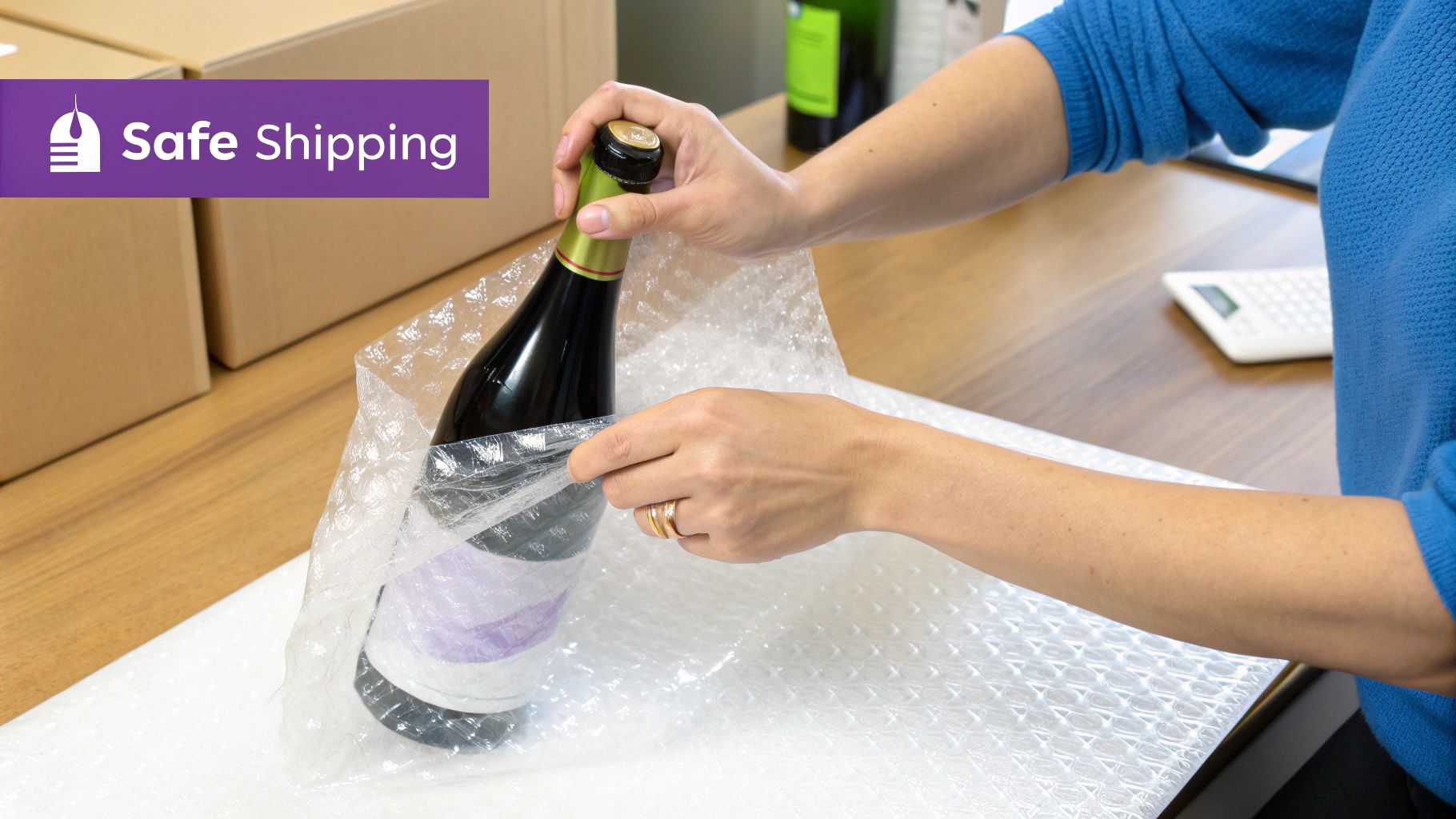
If you think domestic shipping is a maze, sending alcohol across borders is like trying to navigate that same maze in the dark. International shipping introduces a completely new and intimidating layer of regulations, paperwork, and logistical headaches that demand absolute precision from any licensed shipper.
FedEx’s international alcohol shipping service is far more restrictive than its domestic program. It’s built almost exclusively for wine shipments, moving from an approved, licensed business to a consumer in a handful of specific countries. Forget about shipping beer or spirits internationally to customers through this service—it's generally not an option, which narrows the playing field significantly.
Navigating Customs and Foreign Laws
The real challenge with international shipping comes down to dealing with another country's laws. You're not just satisfying state and local rules anymore; you are now on the hook for complying with the import laws, taxes, and duties of the destination country. This responsibility falls squarely on you, the shipper.
Before you even think about taping up a box, you have to verify that the destination country actually allows courier-based alcohol imports from businesses to consumers. Many countries have outright bans or state-controlled monopolies that make direct-to-consumer shipments impossible. Getting this first step wrong is a surefire way to have your shipment seized or destroyed.
Shipper’s Burden of Proof: For every single international shipment, you must provide flawless customs documentation. This means commercial invoices, any required import licenses for the destination country, and perfect declarations of value and contents. Even a tiny mistake can lead to massive delays, expensive fines, or permanent seizure by foreign customs officials.
The Critical Role of Documentation
Perfect paperwork is non-negotiable. With a domestic shipment, a bad label might just get the package sent back to you. With an international one, the consequences are far more severe. You are responsible for accurately calculating and declaring all applicable taxes, duties, and tariffs. These fees change dramatically from one country to the next and can seriously inflate the final cost for your customer.
These kinds of complex rules aren't unique to alcohol; many regulated products face similar hurdles when crossing borders. For businesses that sell a variety of restricted goods, it’s vital to understand how these rules shift from one place to another. You can learn more about how state-specific restrictions apply to different products by reading our detailed guide on the topic.
At the end of the day, FedEx is just the transportation. You are the legal and customs expert for every bottle of wine you send overseas. Success demands deep research, flawless execution, and the understanding that every destination has its own unique rulebook you must follow to the letter.
Your Top Questions About Shipping Alcohol, Answered
Even after you get the hang of the rules, real-world questions always pop up. It's easy to get bogged down in the details, from picking the right FedEx service to figuring out what happens if you slip up. Here are the straight-up answers to the most common questions we hear from businesses navigating the world of alcohol shipping.
The goal here is to cut through the confusion and help you avoid the simple mistakes that lead to returned packages, unhappy customers, and wasted money. Think of this as your go-to guide for those tricky "what if" moments.
Can I Ship a Bottle of Wine to a Friend as a Gift?
This is, without a doubt, the number one question we get. The answer is a hard no. An individual is absolutely forbidden from shipping wine, beer, or liquor through FedEx. Period. This is a privilege reserved only for licensed businesses that have gone through the approval process and signed a formal alcohol shipping agreement with FedEx.
Trying to ship alcohol as a regular person isn't just a minor slip-up; it's a major compliance violation. Best case scenario? The package gets refused at the counter. If it does get into the system, it will likely be flagged, returned at your expense, or even confiscated and destroyed. More importantly, you could be breaking federal and state laws.
What Happens If I Use Non-Approved Packaging?
Using your own boxes or inserts instead of FedEx-approved packaging is a direct violation of your shipping agreement. FedEx insists on specific materials like molded foam or pulp dividers for a very good reason: they've been tested and proven to prevent bottles from breaking and leaking. If you decide to cut corners, a few things could happen.
- Refused at the Counter: An experienced FedEx employee will spot the wrong packaging and refuse to accept your shipment right then and there.
- Stopped in Transit: The package could get flagged mid-journey, pulled from the system, and sent back to you, causing delays and costing you money.
- Liability for a Mess: If your poorly packed bottle breaks and ruins other customers' packages or FedEx equipment, you could be on the hook for the damages.
Key Insight: Proper packaging isn't a friendly suggestion—it's a hard requirement for safety and insurance. Using the right materials protects your product, other people's shipments, and your ability to keep shipping with FedEx.
Following the packaging rules is about more than just checking a box. It's about making sure your product actually gets to your customer in one piece and maintaining a solid relationship with your carrier.
Does FedEx Ground Accept Alcohol Shipments?
Yes, it does. If you're a licensed business with an approved shipping agreement, you can absolutely use FedEx Ground and FedEx Home Delivery for your domestic alcohol shipments. FedEx Express services are also an option, giving you the flexibility to choose based on how fast your customer needs their order.
But remember, the service you pick doesn't change the core rules. You still need that alcohol shipping agreement, you must use the approved packaging, and you have to slap on all the required labels. The choice between Ground and Express simply comes down to balancing delivery speed with shipping costs.
How Does the Adult Signature Required Service Work?
The Adult Signature Required service is not optional—it's mandatory for every single alcohol shipment you send. Think of it as the final, critical checkpoint that keeps alcohol out of the hands of minors.
When the package arrives, the FedEx driver is legally required to verify that the person accepting it is 21 years of age or older. They'll do this by asking for and checking a valid government-issued photo ID, like a driver's license or passport. Once they've confirmed the recipient's age, they'll get a signature. If there's no adult home to sign, FedEx will not leave the package on the doorstep and will typically try to deliver it again later.
Trying to manage these complex rules for every single order is a massive headache. Ship Restrict takes the guesswork out of compliance by letting you set precise shipping rules by state, county, or even ZIP code, so you never accidentally ship to a place you shouldn't. Learn how Ship Restrict can protect your business and save you time.

Cody Yurk
Founder and Lead Developer of ShipRestrict, helping e-commerce businesses navigate complex shipping regulations for regulated products. Ecommerce store owner turned developer.